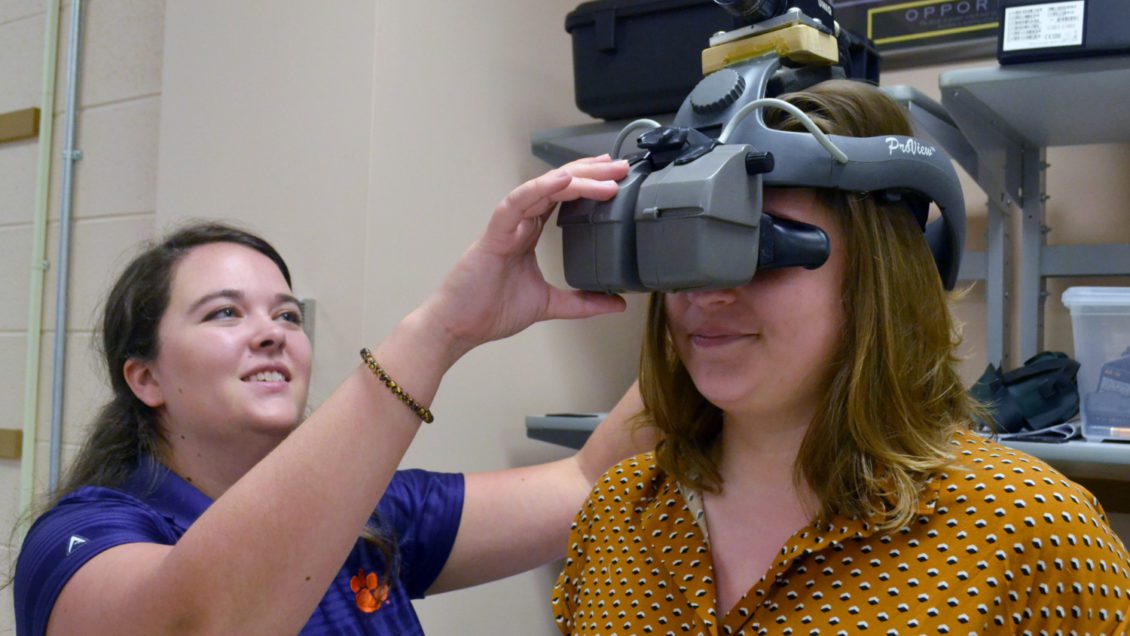
With more companies and even the military investing in virtual reality (VR) training, simulator sickness is also a reality – one that often creates a roadblock to this kind of training.
Understanding this dynamic, Clemson psychology graduate student Sarah Beadle is a on a mission to find out viable solutions to people feeling sick in these simulators.
Since she began graduate school, she’s been studying how people use virtual reality headsets over time, and how that might impact VR training. People can leave a training not feeling well, and that can impact their willingness to participate in future training, Beadle said. Not feeling well may also impact their ability to learn the information provided in training and apply the training outside the virtual environment, she added.
Beadle’s research on virtual reality and motion sickness earned her the RADM Fred Lewis Postgraduate Scholarship from the Interservice/Industry Training, Simulation and Education Conference (I/ITSEC). The scholarship of $10,000 will be used to pay her way to the upcoming conference in Orlando, Florida, in early December as well as support her in her studies at Clemson.
The Interservice/Industry Training, Simulation and Education Conference is the world’s largest modeling, simulation and training conference. Organized by the National Training and Simulation Association, the conference consists of presentations, workshops, exhibits, STEM events and tutorials.
Receiving this scholarship is an honor for her, and she looks forward to attending the conference and networking more with experts in her field of research.
“I’m very excited to attend this conference and see the application of our research,” Beadle said. “There I get to see all the experts in the field talk about the future of this research, as well as network with the other attendees from government research labs, tech industry, and universities.”
Beadle is the fourth Clemson student from psychology professor Eric Muth’s laboratory to receive a scholarship from I/ITSEC.
“I am very proud of Sarah’s achievement and humbled by the recognition and support that I/ITSEC has provided to my laboratory over the years,” Muth said. “Sarah is the most recent student in a line of students who perform cutting edge human factors work on virtual environments. This scholarship recognized the importance of the work to an applied organization that continues to push that cutting edge.”

Throughout her time at Clemson, Beadle’s gotten to collaborate and intern with some of the big companies that attend the Interservice/Industry Training, Simulation and Education Conference.
This past summer, she worked as an intern for Lockheed Martin, a U.S. Department of Defense contractor, in the Rotary and Mission Systems branch, and has worked with the Army Aeromedical Research Laboratory, which studies many topics regarding aviation, injuries and protection, and crew survival in military helicopters and combat vehicles. She’s funded through the Oak Ridge Institute for Science Education and works with a research psychologist there. At these institutions, she’s gotten the chance to identify future problems and propose solutions in regard to motion perception and motion sickness, giving her a chance to apply research conducted at Clemson.
In addition to these opportunities, this scholarship is bringing her one step closer to her goals. Beadle plans to pursue another internship at Lockheed Martin and continue working with the Army Aeromedical Lab. Attending this conference in December will help her learn about new technologies and issues surrounding simulation and training, and Beadle hopes to use what she learns at I/ITSEC to inform her Clemson dissertation to fill a needed research gap in this field of study.
Get in touch and we will connect you with the author or another expert.
Or email us at news@clemson.edu

